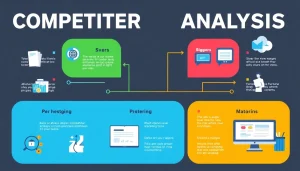Enhancing Marketing Efficiency with AI Marketing Agents: Strategies for Success
Introduction to AI Marketing Agents
In a rapidly evolving digital landscape, businesses are continually seeking innovative solutions to optimize their marketing strategies. One of the game-changers in this sphere is the emergence of AI marketing agents, which are software tools that automate specific marketing tasks using artificial intelligence. By combining machine learning, data analytics, and automation, these agents help marketers streamline their processes while enhancing personalization and effectiveness in achieving campaign goals.
Definition and Functionality
AI marketing agents are sophisticated software applications designed to perform marketing-related tasks, leveraging the power of artificial intelligence to enhance efficiency and effectiveness. These agents utilize advanced algorithms to analyze data, learn from past campaigns, and make data-driven decisions autonomously. They can execute tasks such as segmenting customers, personalizing content, optimizing campaigns, and even performing predictive analytics.
The Role of AI in Marketing
Artificial intelligence has revolutionized the way businesses approach marketing. By analyzing large volumes of data quickly and accurately, AI empowers marketers to gain insights and forecast trends. One of the critical advantages of AI in marketing is its ability to personalize user experiences at scale, which has become essential for retaining consumer attention and loyalty in today’s competitive marketplace.
Benefits of Using AI Marketing Agents
The integration of AI marketing agents brings numerous benefits to businesses, including:
- Increased Efficiency: Tasks that typically require substantial human effort can be automated, freeing up time for marketers to focus on strategy and creativity.
- Data-Driven Insights: AI can process vast amounts of data to uncover insights, helping businesses make informed decisions.
- Personalization: AI agents can tailor marketing messages to individual customers based on their behavior and preferences.
- Enhanced Customer Engagement: Automated responses and personalized content can foster stronger relationships with customers, improving engagement and satisfaction.
- Cost Savings: Reduced operational costs through automation can lead to better ROI on marketing investments.
How AI Marketing Agents Work
Automation of Marketing Tasks
AI marketing agents excel at automating repetitive marketing tasks. For instance, they can handle email campaigns, social media postings, and customer segmentation without human intervention. By analyzing previous interactions and customer data, these agents can determine the best time to send an email, which content to share, and how to engage with audiences effectively.
Human Oversight and AI Autonomy
Despite their capabilities, AI marketing agents operate best with a balance of human oversight and autonomy. While they can execute tasks independently, human oversight is crucial for strategy formulation and ethical considerations. Marketing teams must continuously monitor AI agents to ensure they align with the company’s values and comply with data protection regulations.
Integration with Existing Marketing Tools
For maximum effectiveness, AI marketing agents need to be integrated with existing marketing tools. This integration allows for a seamless flow of data between systems, enabling AI tools to access real-time information to enhance their decision-making capabilities. Many popular marketing platforms now offer APIs or built-in AI functionalities to facilitate this integration.
Types of AI Marketing Agents
Predictive Analytics Tools
Predictive analytics tools use historical data to forecast future outcomes. In marketing, these tools can analyze customer behavior to predict which products a customer might buy, when they might return to purchase again, and how much they are likely to spend. By leveraging these insights, marketers can craft targeted campaigns that resonate with specific customer segments.
Content Personalization Agents
These agents focus on delivering tailored content experiences to users. By analyzing visitor behavior, preferences, and interactions, content personalization agents can adjust website content in real time to provide visitors with the most relevant information. This leads to improved user experience and higher conversion rates.
Campaign Optimization Programs
Campaign optimization tools utilize machine learning algorithms to analyze the performance of marketing campaigns and suggest adjustments. These tools can test different variables—such as ad copy, visuals, and targeting parameters—to identify the most effective combinations. Continuous optimization based on real-time data allows marketers to maximize their return on investment.
Best Practices for Implementing AI Marketing Agents
Assessing Business Needs
Before implementing AI marketing agents, it’s essential for businesses to assess their specific marketing needs and objectives. This assessment includes identifying pain points in existing processes and determining how AI can address these issues. By aligning AI implementation with clear goals, businesses can more effectively measure success and ROI.
Choosing the Right Tool
Not all AI marketing agents are created equal. Businesses should evaluate available tools based on factors such as functionality, scalability, ease of use, and cost. Conducting thorough research, comparing features, and soliciting feedback from other users can help make informed decisions when selecting an AI marketing solution.
Training Teams for Effective Use
Investing in training for marketing teams is critical for effective AI integration. Employees should be educated on how to use AI tools, interpret their outputs, and understand their limitations. Regular training sessions and updates can empower teams to leverage AI marketing agents to their full potential while ensuring they remain adaptable to new developments and features.
Case Studies: Success Stories with AI Marketing Agents
Leading Brands Utilizing AI Agents
Numerous leading brands have successfully integrated AI marketing agents into their strategies. For instance, Coca-Cola uses AI to analyze customer data and preferences, which enables personalized marketing strategies that resonate with different market segments. Similarly, Netflix employs AI-driven recommendation systems to personalize content suggestions, enhancing viewer experience and retention.
Results Achieved with AI Integration
The results from implementing AI marketing agents can be remarkable. According to industry reports, companies utilizing AI for marketing have seen significant increases in conversion rates, improved customer engagement, and enhanced customer satisfaction. For instance, businesses leveraging predictive analytics often experience up to a 15% increase in revenue due to more effectively targeted marketing campaigns.
Lessons Learned and Future Directions
As AI technology continues to evolve, companies are learning to adapt their marketing strategies accordingly. Organizations are recognizing that while AI can enhance efficiency, human creativity and strategic insight remain irreplaceable. Future expectations suggest a more integrated approach, where AI and humans collaborate to create innovative marketing solutions that are both effective and customer-centric.



